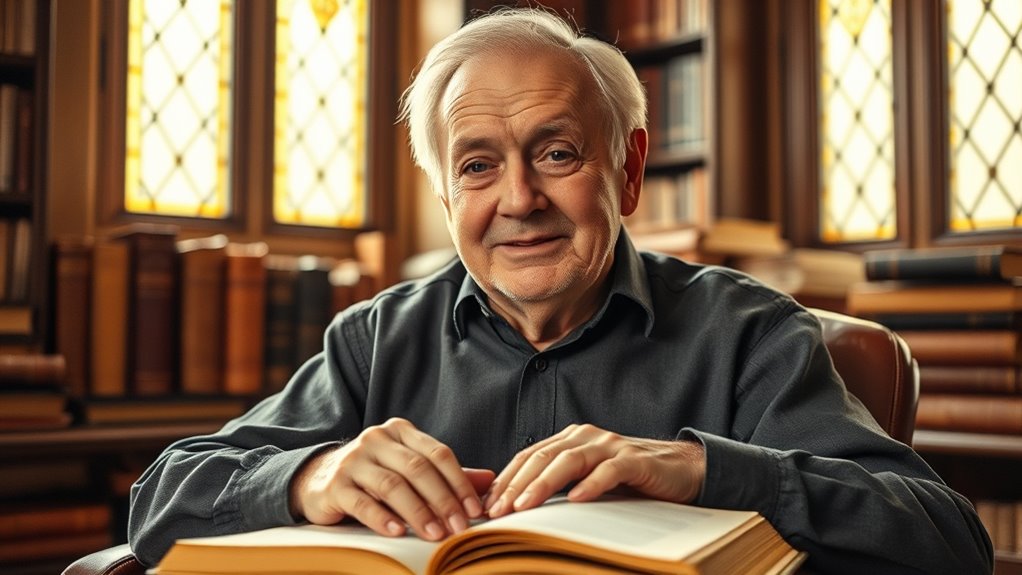Victor Hugo’s idea highlights that the greatest happiness in life comes from knowing you’re truly loved. When you feel loved, your sense of worth and belonging grow stronger, filling your life with inner fulfillment. Self-acceptance and love — both from others and yourself — create a deep foundation for lasting happiness. Understanding this balance can help you build authentic connections and confidence. Keep exploring, and you’ll discover more about how love and self-worth shape true happiness.
Key Takeaways
- Feeling loved affirms our worth and nurtures inner happiness, aligning with Victor Hugo’s view on life’s greatest joy.
- Conviction in being loved fosters self-acceptance, which is essential for genuine happiness and confidence.
- Recognizing love from others enhances our sense of belonging, contributing to emotional well-being.
- Inner conviction of love creates resilience, making happiness less dependent on external circumstances.
- True happiness arises from both feeling loved externally and cultivating self-love internally.

Victor Hugo believed that the greatest happiness in life comes from the simple yet profound feeling of being loved. When you realize that someone cares for you deeply, it fills your heart with a sense of worth and belonging that’s hard to match. Romantic love, in particular, can serve as a powerful affirmation of your value, reminding you that you’re deserving of affection and connection. But Hugo also understood that true happiness isn’t solely dependent on external validation; it begins from within. Self-acceptance is an essential part of experiencing genuine happiness because it anchors you in the understanding that you are enough just as you are. When you embrace your flaws and strengths alike, you create a foundation of confidence that isn’t shaken by outside opinions.
True happiness begins with self-acceptance, anchoring your worth regardless of external validation.
In the pursuit of romantic love, you often seek validation from others, hoping that their affection will fill a void. Yet, Hugo’s perspective suggests that the most enduring happiness comes when you’re secure enough to love yourself first. When you accept your imperfections, you’re better equipped to form authentic connections, free from the need for perfection or approval. Self-acceptance allows you to be vulnerable, to open yourself up to love without fear of rejection or judgment. It’s an essential step in cultivating meaningful relationships because it enables you to be genuine rather than wearing masks to hide insecurities.
Knowing that you’re loved, both by yourself and others, creates a sense of stability that can weather life’s inevitable ups and downs. Romantic love can lift you to new heights, but self-acceptance ensures that you don’t become dependent on that love for your entire sense of happiness. When you recognize your own worth, you’re less likely to chase after fleeting affections or accept less than you deserve. Instead, you cultivate a balanced perspective, appreciating the love you receive and offering it in return without losing sight of your self-value.
Hugo’s belief emphasizes that happiness stems from this dual sense of being loved outwardly and loving yourself inwardly. It’s about finding harmony between these two aspects, so that your sense of fulfillment isn’t fragile or temporary. When you hold onto the conviction that you’re loved, and you genuinely accept yourself, you create a resilient foundation for happiness. This internal peace becomes evident in your relationships, your outlook, and your overall well-being. Ultimately, you realize that the greatest happiness isn’t just about romantic love but about a deep, unwavering confidence that you are worthy of love—both from others and from yourself. Recognizing the importance of self-awareness can deepen this understanding and foster lasting contentment.
Frequently Asked Questions
How Did Victor Hugo’s Personal Experiences Influence His Views on Love?
Your personal heartbreaks and strong family bonds deeply shaped Hugo’s views on love. He experienced loss and longing, which made him cherish genuine connection and affection. These experiences taught you that love provides comfort and happiness, even amid sorrow. Hugo’s life shows that enduring personal pain and close family ties motivate you to value love’s power, reinforcing his belief that knowing you’re loved is life’s greatest happiness.
What Are Some Lesser-Known Works by Victor Hugo Related to Happiness?
You stumble upon hidden manuscripts and unpublished poems that reveal Hugo’s lesser-known thoughts on happiness. These secret works uncover his quiet reflections, blending joy and sorrow in delicate verses. As you explore these rare writings, you sense a deep yearning for fulfillment beyond fame. Hugo’s hidden manuscripts whisper of a happiness rooted in love and inner peace, offering an intimate glimpse into the poet’s heart you’ve yet to fully discover.
How Did Hugo’s Political Beliefs Shape His Understanding of Love and Happiness?
Your political ideology and commitment to social justice deeply influence how you see love and happiness. Hugo believes that true happiness comes from compassion, equality, and fighting for justice, which foster genuine love. By advocating for the oppressed, you find fulfillment and connection, understanding that love grows through acts of kindness and fairness. His beliefs remind you that social harmony and justice are essential to achieving lasting happiness.
What Impact Did Hugo’s Relationships Have on His Literary Themes?
Your relationships deeply influence Hugo’s literary themes, blending romantic idealism with emotional depth. As you explore love’s complexities, he infuses his works with passion and vulnerability, contrasting societal struggles with personal devotion. These bonds inspire characters and stories that mirror his beliefs, showing how love’s transformative power can elevate the human spirit. His experiences create a tapestry where personal connection and societal change intertwine, enriching his timeless exploration of love and happiness.
How Is Hugo’s Philosophy About Love Reflected in Modern Society?
You see Hugo’s philosophy about love reflected today through romantic relationships and societal love. His belief that feeling loved brings happiness still resonates, inspiring people to cherish deep connections. Modern society values genuine affection, compassion, and kindness—core ideas Hugo championed. You can recognize this influence in how communities prioritize emotional bonds and how individuals seek meaningful love, proving Hugo’s timeless view on love continues to shape our understanding of happiness.
Conclusion
Remember, life is a garden where love is the sunlight that makes everything bloom. When you feel truly loved, it’s like a gentle rain nourishing your soul, making your spirit grow stronger and brighter. Without it, you’re like a tree standing alone in a barren field. So cherish the love around you, for it’s the guiding star in your night sky, leading you to happiness. Embrace love, and watch your world flourish.









